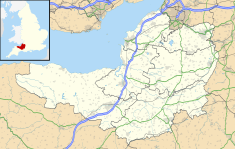Taunton Shire Hall is a municipal building on Shuttern in Taunton, Somerset. The Shire Hall, which serves as a Crown Court, is a Grade II listed building.[1]
| Taunton Shire Hall | |
|---|---|
 Taunton Shire Hall | |
| Location | Taunton, Somerset |
| Coordinates | 51°00′46″N 3°06′28″W / 51.0128°N 3.1077°W |
| Built | 1858 |
| Architect | William Bonython Moffatt |
| Architectural style(s) | Gothic style |
Listed Building – Grade II | |
| Designated | 4 July 1975 |
| Reference no. | 1059958 |
History edit
Since the English Civil War, when the castle was repaired, the county assizes had been held in Taunton Castle.[2] Indeed, it was at Taunton Castle that, in the aftermath of the Monmouth Rebellion, Judge Jeffreys held the Bloody Assizes from 17 September 1685 to 19 September 1685.[3][4][5] After the justices decided, in the mid-19th century, that the facilities the castle were no longer adequate, they chose to procure a new purpose-built building on a site to the south west of the castle.[2]
The foundation stone for the building was laid by the Lord Lieutenant of Somerset, Viscount Portman, on 14 August 1855.[2] It was designed by William Bonython Moffatt in the Gothic style, built by a local contractor, George Pollard, and completed in 1858.[1] The design, which was crenellated, involved an asymmetrical main frontage with eleven bays facing onto Shuttern; the central section, which slightly projected forward, featured a large archway on the ground floor with a balcony and an oriel window on the first floor and an oculus in the gable; there were turrets at roof level.[1] Internally, the principal rooms were the courtrooms and the Grand Jury Room which was behind the oriel window.[2]
Shortly after the building opened, a bust of the locally-born naval commander, Admiral Robert Blake, by Edgar Papworth was installed in the reception area.[6][7] A bust of the locally-born novelist and dramatist, Henry Fielding, was unveiled by the American Romantic poet, James Russell Lowell, on 8 September 1883[8][9] and a bust of the locally-born soldier, Colonel John Chard VC, was unveiled by the Commander-in-Chief of the Forces, Field Marshal Viscount Wolseley, on 2 November 1898[10]
The Shire Hall continued to be used as a facility for dispensing justice but, following the implementation of the Local Government Act 1888, which established county councils in every county, it also became the meeting place of Somerset County Council.[11] Following the First World War, a plaque was unveiled which commemorated county council employees who had died in the war.[12]
After the County Council moved to County Hall in 1935, the former Shire Hall continued to be used as a Crown Court.[2] A programme of refurbishment works were completed in 2018 following the discovery of structural issues with the building.[13]
References edit
- ^ a b c Historic England. "Shire Hall, Taunton (1059958)". National Heritage List for England. Retrieved 13 August 2019.
- ^ a b c d e "Shire Hall in Taunton: The fascinating history of this 162-year-old building that needs urgent repairs". Somerset Live. 11 April 2018. Retrieved 15 August 2019.
- ^ "Taunton Castle". Everything Exmoor. Archived from the original on 5 May 2008. Retrieved 21 November 2007.
- ^ "The Bloody Assize". Somerset County Council. Archived from the original on 7 August 2011. Retrieved 21 October 2012.
- ^ "Donald E. Wilkes, Jr. Collection: The Bloody Assizes". University of Georgia. Archived from the original on 22 April 2021. Retrieved 6 December 2020.
- ^ "Interior Ground Floor Waiting And Reception Area Detail Of Bust To Robert Blake". Historic England. Retrieved 26 October 2020.
- ^ Papworth, Wyatt (1895). . In Lee, Sidney (ed.). Dictionary of National Biography. Vol. 43. London: Smith, Elder & Co. pp. 194–195.
- ^ "Fielding". The Sydney Mail and New South Wales Advertiser. 27 October 1883. p. 774. Retrieved 26 October 2020.
- ^ "Unveiling the Bust of Fielding at the Shire Hall, Taunton". Look and Learn. Retrieved 26 October 2020.
- ^ Vetch, Robert Hamilton (1901). . In Lee, Sidney (ed.). Dictionary of National Biography (1st supplement). Vol. 1. London: Smith, Elder & Co.
- ^ "Local Government Act 1888". Legislation.gov.uk. Retrieved 17 August 2019.
- ^ "Somerset County Council". Imperial war Museum. Retrieved 26 October 2020.
- ^ "Builders called in as urgent repairs needed at Taunton Crown Court". Somerset Live. 9 April 2018. Retrieved 14 November 2020.
